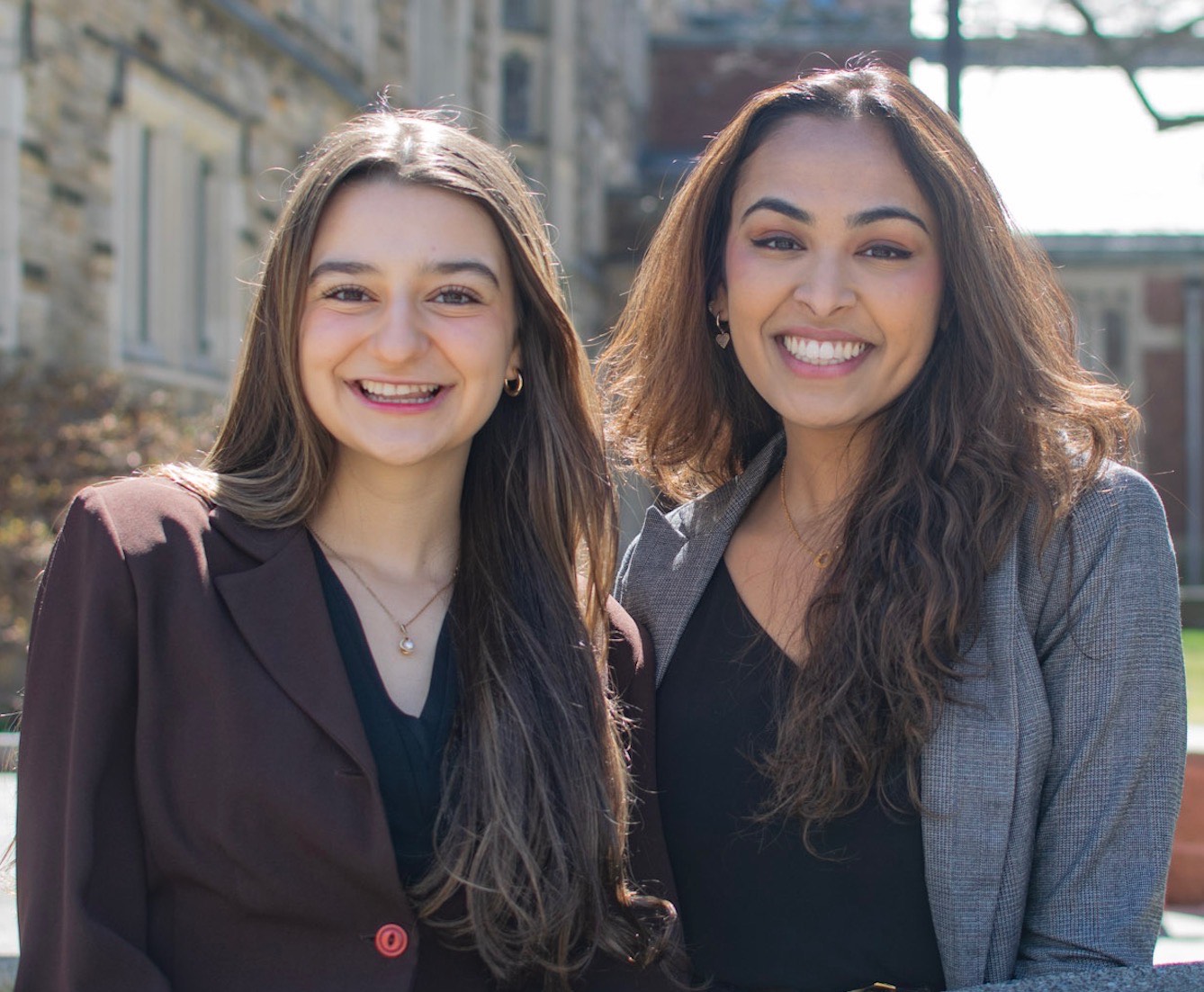CANDIDATE PROFILE: Mimi Papathanasopoulos ’26 and Esha Garg ’26
Mimi Papathanasopoulos ’26 and Esha Garg ’26 are running on a joint ticket for YCC president and vice president. The pair is focused foremost on student engagement and mental health.

Courtesy of Mimi Papathanasopoulos and Esha Garg
Yale College Council presidential candidate Mimi Papathanasopoulos ’26 is looking to change how Yalies engage with the YCC.
In her platform — “Together Yale” — with vice presidential candidate Esha Garg ’26, Papathanasopoulos said that they are also planning to expand on reform to mental health care. For Papathanasopoulos, who currently serves as the sophomore class president and health and accessibility director on the YCC’s executive board, her motivation stems from the positive feedback to the recent YCC push making mental health an explicit reason to request Dean’s Extension, which she helped lead.
“I know this is kind of silly, but there was a Fizz post about the Dean’s Extensions for mental health and I think got two thousand upvotes,” Papathanasopoulos said. “Everyone was like ‘Yay, the YCC is doing something exciting!’ And that made me so happy.”
Papathanasopoulos and Garg, a YCC senator for Grace Hopper College and deputy dining policy director, have both worked in the YCC for two years. They say that their combined experience would help to expand the broad reach of YCC projects.
“Esha and I are unique because we’ve had experience across all sectors of the YCC, so events, the policy side and executive board,” Papathanasopoulos said. “So we’ve really gotten to get to know how the YCC functions and have a lot of relationships with student organizations, and also administrators.”
Beyond pushing to add mental health as an explicit reason to request a Dean’s Extension, Papathanasopoulos has worked on the YCC’s campaign alongside Yale administration to install period product dispensers in University bathrooms. She also has worked on YCC efforts to reserve a space for deaf and hard of hearing students in front of interpreters at Spring Fling and organized the sophomore formal. Garg has worked with Yale facilities to ensure working water fountains on Old Campus, ensuring that the University provides furniture to sophomore suites and increasing administrative support for students who stay on campus over spring break.
Papathanasopoulos and Garg said that they are hoping to expand on the initiatives they have worked on in their YCC tenure.
Their platform includes six areas of policy focus: Student Engagement, Funding Student Orgs and Cultural Centers, FGLI Support, Health & Accessibility, NHV Engagement and Sustainability. Their top goal, they emphasized in their platform, is to “work together,” or build relationships with students “so that we can all work together and build off each other’s progress to drive meaningful change.”
The pair noted that to achieve this goal they want to prioritize increasing student involvement in the YCC.
“One thing we’ve noticed is people don’t always come to office hours or town halls,” Garg said. “But we want to make sure that we’re actually making the effort to outreach directly into the community, rather than expecting people to come to us. Yeah, that’s a really big part of our entire path forward.”
They said that they also plan to establish a “Student Engagement Branch” within the YCC to spearhead YCC outreach to students.
Per their platform, the new branch will be responsible for “monitoring student outreach completed by the President, Vice-President, and Senators” and monthly meetings with leaders of various student groups that are often “overlooked” in YCC determinations and initiatives.
“We want to forge strong relationships and bonds with student organizations and collaborate with them,” Papathanasopoulos said. “And we also want to advocate and uplift everyone’s voice.”
In their interview with the News, Papathanasopoulos and Garg also acknowledged recent student criticism of the YCC, specifically responding to claims that YCC presidential candidates make big promises that end up being unrealistic.
“I also think that everything in our platform, we have thought through very carefully and think that everything is very realistic and could definitely happen,” Papathanasopoulos said. “Just from our conversations with administration, we understand where they push back and how we can be creative with solutions to answer that.”
Garg added that the pair decided to scale back certain promises on their platform to ensure that they can be accomplished.
For example, the pair said that they decided to specify how exactly making laundry in the residential colleges free for students, a common platform item of YCC presidential campaigns, can be accomplished. On their platform, they said that they plan to “push administrators to break the CSC contract” which is set to end in 2026 and ensure that the new contract includes free laundry.
“I feel like every YCC administration promises to free laundry, and it never happens, because it’s very complicated,” Garg said. “And we’ve been very realistic on our platform by stating: we will either try to make Yale break that contract early or we’re going to work towards making a better and new contract in 2026.”
The pair also added that they want to expand the YCC policy tracker to include what policy items have been completed and accepted by the administration and more specific information on administrative pushback.
Voting begins on April 18 at 9 a.m. on YaleConnect and closes at 9 p.m. on April 19.







